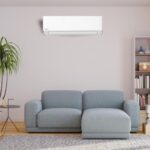Using a refrigerator involves more than just storing food. To avoid a surge in your electricity bill, there are a few things to keep in mind. A veteran electrician advises against storing these three types of items in your fridge for energy efficiency:
Potted Plants: While they may seem harmless, potted plants can cause issues when placed on top of your fridge. Despite their air-purifying qualities, the moisture from watering and fertilizing can impact the refrigerator’s functionality, leading to rust and long-term malfunctions. Additionally, plants attract insects and microorganisms, which can contaminate your food if they find their way inside.

The presence of potted plants on top of the refrigerator is a common sight in many households.
Small Appliances: It’s not uncommon to see small appliances like ovens and microwaves perched on top of refrigerators when counter space is limited. However, this practice can lead to unwanted radiation interference, affecting the performance of both the fridge and the appliances themselves. The weight of these appliances also puts extra pressure on the refrigerator, hindering its cooling ability and resulting in higher energy consumption.

Small appliances like ovens and microwaves should not be stored on top of the refrigerator.
Dust Covers: While it may seem like a good idea to keep your refrigerator dust-free, using a dust cover can do more harm than good. Refrigerators rely on efficient heat dissipation, and obstructing this process can lead to reduced cooling performance and even damage to the appliance. By covering your refrigerator, you’re forcing it to work harder to dissipate heat, which can shorten its lifespan and cause breakdowns.
In conclusion, while it’s important to keep your refrigerator organized and aesthetically pleasing, it’s crucial to avoid these three types of items to ensure energy efficiency and prolong the life of your appliance.
The Air Conditioner Conundrum: Why the “4 Don’ts and 3 Do’s” Rule is a Must for Buyers
“Through trial and error, I’ve learned the hard way that you can’t always trust the salesperson’s pitch when it comes to air conditioners. Over time, I’ve had to replace three units due to my inexperience. From now on, I’ll be following the “4 No-Buys and 3 Must-Buys” rule when purchasing air conditioners to ensure I make the right choice.”



































